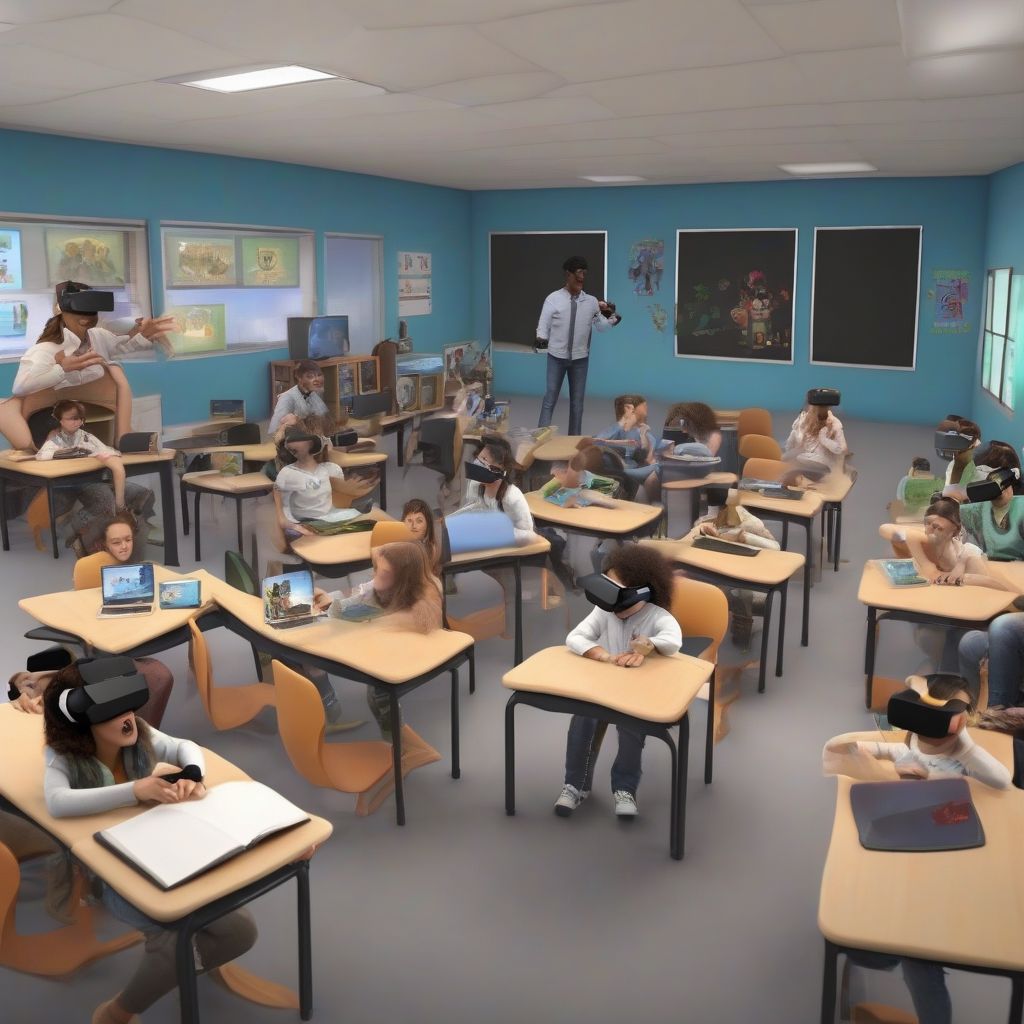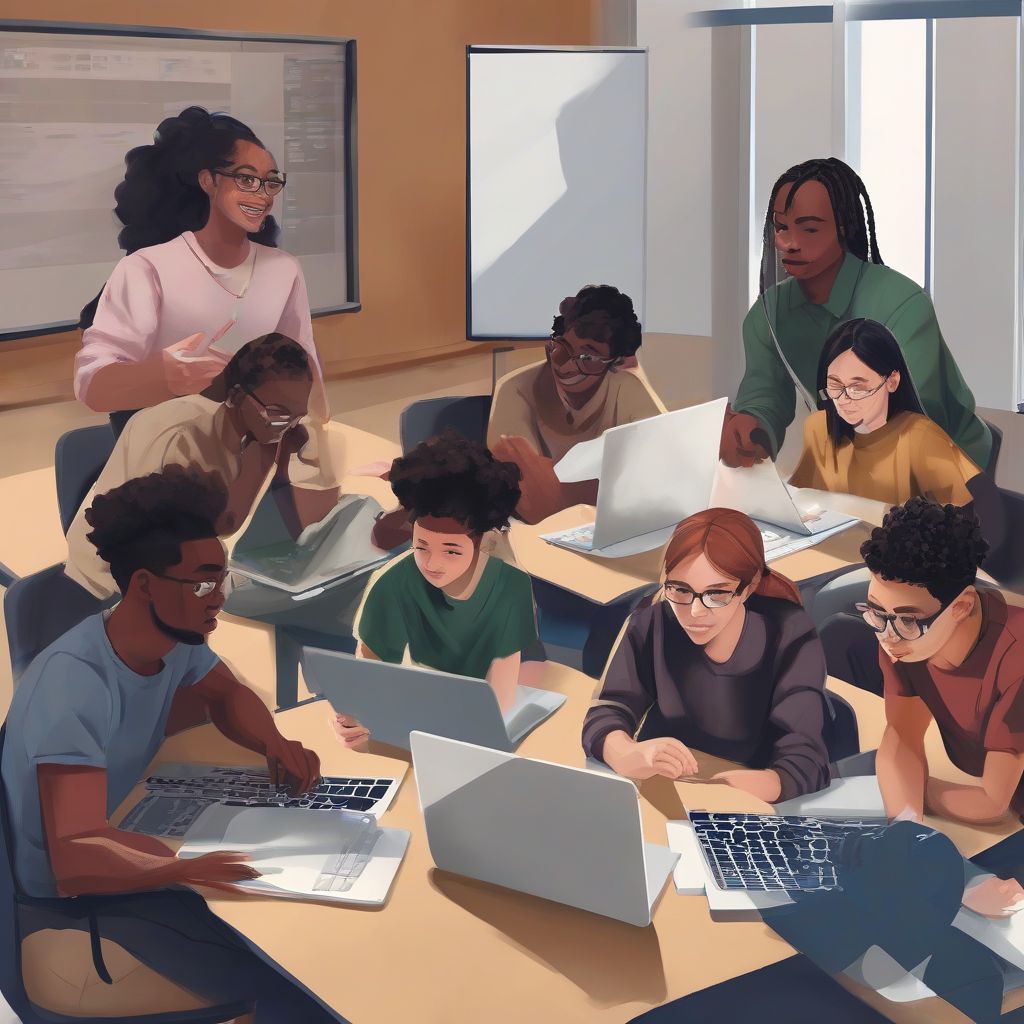Imagine a classroom where learning is as engaging as a video game, as personalized as your favorite app, and as accessible as your smartphone. This isn’t a scene from a sci-fi movie; it’s the future of education, powered by the rapid evolution of educational technology. As we stand on the cusp of 2024, let’s delve into the exciting trends poised to reshape the learning landscape.
The Rise of Immersive Learning Experiences
Remember the days when textbooks and lectures were the primary tools of education? Those days are fading fast. Immersive technologies like Virtual Reality (VR) and Augmented Reality (AR) are breaking down classroom walls and transporting students to ancient civilizations, deep-sea ecosystems, and even outer space – all without leaving their seats.
Virtual Reality: Stepping into New Worlds
VR offers a level of immersion that traditional learning methods can’t match. Imagine history students walking through the Colosseum in ancient Rome, or biology students exploring the human body from the inside out. This technology fosters deeper engagement, improves knowledge retention, and makes learning an unforgettable adventure.
Augmented Reality: Enhancing Reality with Digital Layers
AR overlays digital elements onto the real world, enriching textbooks and classroom activities with interactive 3D models, videos, and animations. Picture students dissecting a virtual frog on their desks or taking a virtual field trip to the Amazon rainforest through their tablets. AR bridges the gap between the physical and digital worlds, making learning more interactive and exciting.
 Virtual Reality Classroom
Virtual Reality Classroom
Personalized Learning: Tailoring Education to Individual Needs
Just like we have personalized recommendations for music and movies, educational technology is enabling personalized learning journeys tailored to each student’s strengths, weaknesses, and learning styles.
Adaptive Learning Platforms: Meeting Students Where They Are
Imagine a digital learning platform that adjusts the difficulty level of exercises based on a student’s performance, providing personalized support and challenges. Adaptive learning platforms analyze data to identify learning gaps and tailor content accordingly, ensuring that every student progresses at their own pace.
AI-Powered Tutors: Personalized Guidance at Your Fingertips
Imagine having a virtual tutor available 24/7 to answer questions, provide feedback, and offer personalized guidance. AI-powered tutors are becoming increasingly sophisticated, offering tailored support that helps students grasp difficult concepts and stay motivated.
The Power of Data: Driving Informed Decisions in Education
Data is revolutionizing education by providing educators with valuable insights into student performance, learning patterns, and areas for improvement.
Learning Analytics: Unlocking Insights from Data
Learning analytics platforms track student activity within digital learning environments, providing educators with data on student progress, engagement, and areas where they might be struggling. This data empowers educators to make informed decisions about their teaching strategies, personalize instruction, and provide timely support.
Predictive Analytics: Identifying Students at Risk
Imagine identifying students who are at risk of falling behind even before they start struggling. Predictive analytics uses data to identify patterns and predict future outcomes, allowing educators to intervene early and provide targeted support to students who need it most.
The Future is Collaborative: Breaking Down Barriers in Education
Educational technology is fostering collaboration and communication, connecting students and educators from all corners of the globe.
Global Learning Communities: Connecting Students Worldwide
Imagine students from different countries collaborating on projects, sharing their perspectives, and learning from each other’s experiences. Online platforms and collaborative tools are breaking down geographical barriers, fostering cross-cultural understanding, and preparing students for a globalized world.
Gamification and Social Learning: Making Education Fun and Engaging
From educational video games to interactive simulations, gamification is transforming learning into an immersive and enjoyable experience. By incorporating game-like elements such as points, badges, and leaderboards, educators can boost student engagement and motivation.
 Students Collaborating Online
Students Collaborating Online
Conclusion: Embracing the Future of Learning
The educational technology landscape is evolving at an unprecedented pace, opening up a world of possibilities for enhancing the learning experience. As we look ahead to 2024 and beyond, it’s clear that immersive technologies, personalized learning, data-driven insights, and collaborative learning environments will play a pivotal role in shaping the future of education.
What excites you most about the future of educational technology? Share your thoughts and join the conversation!
[amazon bestseller=”educational-technology”]
